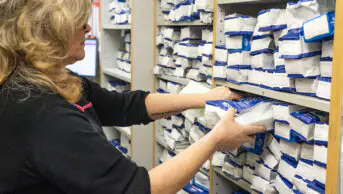
alexsl/iStockphoto
This content was published in 2010. We do not recommend that you take any clinical decisions based on this information without first ensuring you have checked the latest guidance.
In a previous article (PJ, 17 July 2010, p92), we discussed the role of the National Institute for Health Research’s clinical research network and the opportunities they provided for pharmacists.
The network aims to:
- Make sure that patients and healthcare professionals from all parts of the UK are able to participate in and benefit from clinical research
- Integrate health research and patient care
- Improve the quality, speed and co-ordination of clinical research
- Increase the collaboration with industry partners to make sure that the NHS can meet the health research needs of the pharmaceutical industry
A number of topic-specific networks coordinate clinical and health research for cancer, stroke, mental health, diabetes, medicines for children, dementias and neurodegenerative diseases. A separate primary care research network focuses on disease prevention, health promotion, screening, early diagnosis and the clinical management of long-term conditions in the community. At the same time, the comprehensive clinical research network coordinates clinical and health research in disease areas outside the above conditions and primary care priorities.
This article focuses on comprehensive local research networks (CLRNs) within the comprehensive clinical research network, gives examples of pharmacy involvement and future opportunities.
The CLRNs provide an infrastructure to support research, for example, provision of research personnel and facilities to support research recruitment. Therefore, CLRNs need the support of pharmacists and pharmacy in the form of:
- Pharmacists as trained research support staff to take samples, run clinics or manage patient data
- Pharmacists to help identify and recruit patients onto portfolio studies (Research studies that meet specific eligibility criteria are recorded in a database known as the UK Clinical Research Network Portfolio, which comprises the NIHR clinical research network portfolio in England and the corresponding portfolios of Scotland, Wales and Northern Ireland. Portfolio studies are eligible for support from the NIHR clinical research networks.)
All CLRNs need a network of committed pharmacists (and pharmacies) that are willing and able to be involved in local research.
The significance of the role that pharmacy can play is highlighted by the fact that access to pharmacy (location, knowledge and expertise) has been identified as a barrier to supporting research across all health sectors. Therefore, pharmacy engagement with research is a national priority for the CLRNs.
To address this, some CLRNs are funding pharmacists to assist pharmacy involvement in research on the NIHR portfolio.
Richard Harris is a pharmacist employed by NHS Doncaster as a pharmacy research champion through a grant from South Yorkshire CLRN. Since the beginning of 2009 he has invested much time in talking to local pharmacists asking them if they were interested in being involved in research and what were the barriers, what would help them overcome those barriers, what areas of research they were interested in and at what level they might wish to get involved (for example, recruiting patients to studies, delivering an intervention in practice, developing their own research etc).
Mr Harris has had success in engaging pharmacists in a range of studies including exploring pain relief in palliative care, a sociological study exploring pharmacists’ commitment to their profession and an NIHR portfolio study exploring the impact of incentives on the behaviour and performance of primary care professionals.
One study involved 20 community pharmacists taking part in a qualitative telephone interview that lasted approximately one hour. Each pharmacist received a payment of £50 as compensation for their time. A few of the participants were a little apprehensive before taking part owing to their lack of experience and worries about the amount of time it would take. However, the feedback after the process was universally positive, with many citing the process as enjoyable and satisfying. Activities and thoughts surrounding the new community pharmacy contract were explored and it was thought that the project gave an opportunity for pharmacists to air their opinions, which would subsequently be published.
Mahendra Patel, consultant pharmacist and pharmacy academic lead for the Yorkshire CLRN, also plays a key role in pharmacy engagement in NIHR portfolio research. He has engaged with stakeholders across Yorkshire (including NHS trusts, primary care trusts, pharmacy chains, superintendent pharmacists, chief pharmacists and research pharmacist leads) to promote pharmacy awareness and involvement in research. His role has also involved working with local research leads to identify opportunities where pharmacists could support existing NIHR portfolio studies.
Dr Patel, like Mr Harris, has worked with pharmacists to identify the barriers they experience when trying to develop and engage in research. Clearly a number of common themes surfaced, notably within community practice, where commercial and financial incentives for engagement and staffing capacity (also a concern in secondary care) were key issues. Among the smaller independents there was apathy and only a faint awareness of local research activity. However, some pharmacists did express interest in wanting to develop their personal and professional development and further career progression. Others wanted to engage in research but were not confident in their ability to take part, having left academia some time previously. Many wanted to embark on research but had no real idea of how to go about drafting a proposal and which organisations, if any, would provide support and help. However, many were enthusiastic and generated some interesting research ideas.
Why get involved
So, why get involved? The benefits in terms of professional and practice development were highlighted in our previous article (op cit). However, with the recent publication of the White Paper “Equity and excellence: liberating the NHS”, it is worth reinforcing the message that pharmacy needs to strengthen its evidence base and play a greater role in contributing to multidisciplinary health research. In doing so, pharmacists will retain and build upon their integral role as experts in medicines within the healthcare team.
It is recognised that healthcare professionals are extremely busy and pharmacists are no exception. Therefore, pharmacists can expect to be compensated for their involvement in NIHR studies. In this way pharmacists stand to benefit from involvement, without incurring financial loss.
Pharmacists wanting to get involved can contact their CLRN directly and express an interest in being involved in local research activity. They can also search the NIHR portfolio to find out what research is being undertaken in their area.
There is also a need for professional networks to be linked. The importance of having a local research lead to help foster relations across different sectors is essential. Often research is ongoing in a number of important areas of which colleagues are not aware — even if they are part of the same organisation.
Regular meetings to share and generate ideas with other pharmacists could help to generate innovative pieces of research as well as allowing common interests to flourish. Cross-sector pharmacy engagement can also help interesting research partnerships to develop. The Royal Pharmaceutical Society’s local practice forums can play a key role in being the local hub for pharmacy research and a valuable source of expertise that the CLRNs can go to.
There is an element of “chicken and egg” here since, to enable pharmacy to get involved in research, a wider range of studies is needed across the UK that seek to make use of pharmacy expertise. There is a shortage of portfolio studies that recruit patients within pharmacies and many researchers in health are not aware of pharmacists’ role or their unique position in the community and healthcare team.
Pharmacists (and pharmacy) are often not factored into the design of studies and, consequently, there is a greater need to have more pharmacy studies on the NIHR portfolio, as well as broader research agendas incorporating the pharmacist in the design and delivery of research. Researchers in pharmacy should therefore endeavour to get their studies on the NIHR portfolio to enable greater pharmacist engagement with research and to support study planning, set-up and delivery.
To whet the appetite of those pharmacists who are interested in getting involved there are a number of opportunities with forthcoming portfolio studies including:
- “Pharmacist intervention in the treatment of minor ailments” — a study that will derive evidence to inform recommendations regarding the future delivery of minor ailments services in community pharmacies in the UK
- “Professional engagement of locum community pharmacists” — a study that will contribute to the knowledge base for this significant pharmacy workforce population and wider issues of professionalism, work stresses, service development and revalidation
- “An investigation of the current level of pharmaceutical services and medication reviews in care home settings” — a study that will contribute to the evidence base for the development of a new service model for improved patient care
Further information on how to get involved is provided in the Panel.
HOW TO GET INVOLVED
To identify your comprehensive local research network go to: www.crncc.nihr.ac.uk/about_us/ccrn
To search the NIHR portfolio go to: www.crncc.nihr.ac.uk/about_us/processes/ portfolio/p_search
For research support and guidance go to: www.rpharms.com/research
Pharmacists interested in any of the studies mentioned in the article are invited to contact the Royal Pharmaceutical Society’s science and research team (tel 020 7572 2466, email practiceresearch@rpharms.com).

